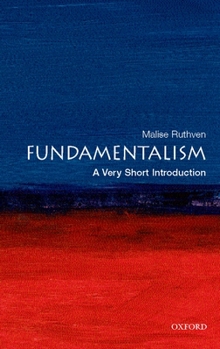Fundamentalism: A Very Short Introduction (Very Short Introductions)
(Part of the Very Short Introductions (#155) Series and Oxford's Very Short Introductions series (#155) Series)
Select Format
Select Condition 
Book Overview
Fundamentalism is seen as the major threat to world peace today, a conclusion impossible to ignore since the events in New York on September 11, 2001. But what does "fundamentalism" really mean? Since it was coined by American Protestant evangelicals in the 1920s, the use of the term "fundamentalist" has expanded to include a diverse range of radical conservatives and ideological purists, not all religious. Fundamentalism could now mean both militant Israeli settlers as well as the Islamist radicals who oppose them, it can mean Christians, Hindus, animal liberationists, and even Buddhist nationalists. Here, Middle East expert Malise Ruthven investigates fundamentalism's historical, social, religious, political, and ideological roots, and tackles the polemic and stereotypes surrounding this complex phenomena--one that eludes simple definition, yet urgently needs to be understood.
Format:Paperback
Language:English
ISBN:0199212708
ISBN13:9780199212705
Release Date:February 2007
Publisher:Oxford University Press
Length:176 Pages
Weight:0.39 lbs.
Dimensions:0.4" x 5.0" x 6.9"
Customer Reviews
3 ratings
Readable and Incisive look at Fundamentalism
Published by Thriftbooks.com User , 16 years ago
Ruthven's introduction to fundamentalism is excellent. It is easy to read, but there is substance too as Ruthven puts fundamentalism in historical and sociological context. He achieves this by carefully surveying and comparing Christian, Islamic and other forms of fundamentalism. Along the way, he presents a useful raft of identifying characteristics. In so doing, he avoids the one-size-fits-all approach, which serves no one. In particular, he identifies and explains a number of important issues ranging from the impact of religious pluralism to the nature of truth statements. I thought his comparison on the place of religion in European and American society was very good. This is useful book for teachers, clergy, academics and interested readers.
Provocative analysis
Published by Thriftbooks.com User , 16 years ago
Don't be deceived by how short this book is. It is an intellectual powerhouse that cleverly presents the major developments and nuances of fundamentalism in its varied religious, political and social forms. Author Malise Ruthven is an exceptional guide on this semantic, religious and social journey as he delves into uncharted territories that a casual reader would never even begin to think are related to this complex subject. In this provocative book, Ruthven draws amazing links among conceptual beliefs and modern issues, including globalism, feminism, nationalism, modernism and politics. Given how well this little gem sustains its high level of intelligent investigation, getAbstract recommends it to readers intrigued by the subject. Even if you know what the newspapers say about fundamentalism, you will learn something here.
Definition & history with feminist, economic & political implications
Published by Thriftbooks.com User , 17 years ago
This is such an excellent little book, I have to say that it's probably the best book I've read in the last couple of years. Although fundamentalism is a product of Protestant Christianity, Ruthven takes you through examples in Islamic, Jewish, Hindu and even Buddhist fundamentalisms. There are explanations on what conditions enable the rise of religious fundamentalism and what tempers it. The book introduces issues affecting fundamentalism such as: identity, modernity, traditionalism and how religious fundamentalism is intended as a backstop against modernity, yet is ironically made more secular in the process. The author mainly focuses on examples of international political-religious conflicts as a way to explain fundamentalism's connection to politics. In addition, Ruthven explores the role of women in societies influenced by fundamentalism. This is an amazing and wonderful book which is incredibly well-written and extremely timely. I highly recommend it and I'm looking forward to reading more from this series and from Malise Ruthven.






